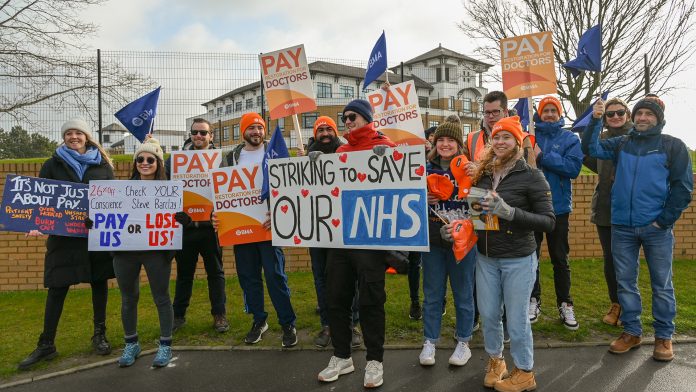
Junior doctors are willing to end the ongoing NHS strikes if the UK Government makes a credible offer, says the British Medical Association (BMA).
This week’s NHS strikes led by the junior doctors represents the most prolonged consecutive industrial action in the health service’s history.
The strikes follow a lengthy dispute with the government over pay restoration. Junior doctors did enter talks with the government last year, but those negotiations failed to reach a resolution, ending in early December.
The industrial action has already profoundly affected the NHS, impacting scheduled operations and hospital services and increasing wait times.
The NHS has expressed concern amid one of the most challenging periods of the year, with growing winter pressures of flu and COVID-19 cases exacerbating the issues.
Why are junior doctors taking industrial action?
The NHS strikes are taking place for six days between 7 am on Wednesday 3 January, and 7 am on Tuesday 9 January.
Junior doctors are calling for pay restoration as their salaries have been cut by over a quarter since 2008.
The BMA has called for a 35% pay increase to accommodate for inflation, the cost-of-living crisis, and rising workloads that are driving junior doctors out of the profession.
Speaking to the BBC, BMA junior doctor leader Dr Vivek Trivedi said that they are not even expecting this to all happen in one year and would be happy to look at solutions that span several years.
Trivedi also explained that if the government are willing to come to the negotiating table and make a credible offer, strike action can be suspended for the rest of the week.
The government failed to make a credible offer during negotiations in December and had known for four weeks that strikes would occur without making a ‘final offer’.
Despite this, Health Secretary Victoria Atkins says the government is unwilling to negotiate while strikes are ongoing.
The government previously increased pay for junior doctors by 9% this financial year, discussing a potential 3% increase on top of this.
However, this is far below the 35% junior doctors are asking for, and it remains unclear if NHS strikes will continue throughout the year if pay restoration cannot be agreed.
Impacts on the NHS
The NHS strikes have already disputed most routine healthcare visits, with A&E waiting times rising, prompting senior doctors to be drafted in.
NHS National Medical Director Professor Sir Stephen Powis emphasised the pressures the NHS is facing: “As the longest strike in the history of the NHS begins during one of the busiest and most challenging weeks of the year – the health service is experiencing the winter pressures of flu and COVID-19 combined with the huge disruption of industrial action.
“We know hospitals are already experiencing significant demand with other NHS services also under immense pressure – and although staff are doing the very best for patients with extensive preparations in place, there is no denying the NHS has started the year in a very difficult position.
“This latest round of strike action will not only have an impact on this week but will have an ongoing effect on the weeks and months ahead, as we struggle to recover services and cope with heavy demand.
“Our message for patients remains the same – continue to come forward for care using 999 and A&E in life-threatening emergencies and 111 online for everything else.”

























